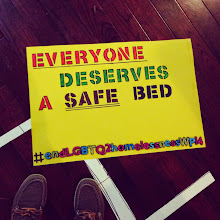
I am deeply affected by the recent suicide of 15-year-old Jaimie Hubley from Ottawa, ON. Jaimie faced ongoing homophobic bullying and was treated cruelly in his high school because he was gay. He was made fun of because he chose figure skating over hockey. He tried to start a Rainbow Club, but the other students tore down his posters.
How many youth will need to be murdered by homophobia before people start to change?
My work focuses on LGBTQ youth homelessness in Canada.
I devote my life work to LGBTQ youth and to making Toronto a safer, more accessible, and supportive city for LGBTQ homeless youth. I’m very aware that we still have a lot of work to do. We need to invest more money into programs for LGBTQ youth, especially LGBTQ youth who are homeless. We NEED to STOP the homophobia and transphobia that throws 25-40% of youth out of their homes. We NEED to STOP the homophobia and transphobia that then kicks the same youth out of the shelter system, and we NEED to STOP the homophobia and transphobia that makes them then fear their lives on the streets. WE NEED TO STOP THIS NOW.
It is not okay that youth experience homophobia and transphobia in their homes, in school, in the shelter system, on the streets. WAKE UP, Canada.
We keep talking about how it gets better. Well, it’s time now that WE MAKE IT BETTER. Too many young people are dying because of hate. We need to implement strategies that will lead to change. People need to be educated. Homophobic slurs are not okay, no matter how busy you are (as a teacher or frontline worker), you need to STOP these incidents from occurring every single time.
We all need to stop and think about Jamie’s death.
We need to reflect and think about how to become a more accepting society.
Let’s start with the basics and learn about love.
Let’s teach each other how to ACCEPT love and authenticity.
It seems so simple, doesn’t it? Yet, as a society we have failed on every level.
So, let us start anew, because I believe that it can get better. We just need to put our hearts into this.
-Alex ilona Abramovich
The Lesbian Gay Bi Trans Youth Line: 1-800-268-9688 askus@youthline.ca http://www.youthline.ca
Kids Help Phone: 1-800-668-6868

